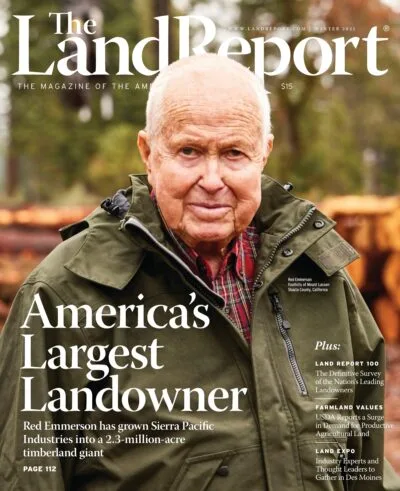Great Exchange: How to Use 1031 Exchanges to Your Advantage
Great Exchange: How to Use 1031 Exchanges to Your Advantage

1031-exchange
Ask any big-league broker to name the single most effective real estate investment tool. Don’t limit yourself to ranch brokers or real estate agents who specialize in islands or farmland or some other rural land. Ask commercial brokers in major urban centers, subsurface guys who buy and sell mineral rights, and corporate types who package shopping centers and apartment building. The top response is bound to be the 1031 Exchange, and the reason is simple.
By Bill Winke
1031s are a tool anyone can use with any type of investment property. Commercial investors use it. Ag speculators use it. Raw land buyers use it. And for all those reasons, and many more, 1031s are one of the key factors keeping a fire lit under the land boom.
The 1031 Exchange is a much-used method for turning a little into a lot. Understanding how it works is critical to making the best use of this important investment tool.
DEFINITION
Section 1031 of the Internal Revenue Code states that:
“… no gain or loss is recognized if property held for productive use in a trade or business or for investment
| “1031s are a tool anyone can use with any type of investment property.” |
is exchanged solely for property of a like kind to be held either for productive use in a trade or business or for investment.”
What this means to anyone who invests in rural land is that as long as you roll the profits from one piece of investment property into another, Uncle Sam won’t make you fork over any capital gains taxes right away. In essence, what the government is doing by deferring these taxes is making you a tax-free loan,one you can only invest in another piece of property.
QUALIFIED INTERMEDIARY
The only way to avoid paying capital gains taxes is for the taxpayer never to have actual or constructive receipt of any of the funds involved. That’s where a Qualified Intermediary comes in. This is the individual or company at the heart of your 1031 Exchange.
My lawyer handles most of my real estate transactions, and he typically finds another attorney to act as the Qualified Intermediary. But there are literally hundreds of specialized companies set up to serve as Qualified Intermediaries, including ones owned by highly regulated, publicly traded companies. Remember, the Qualified Intermediary does not have to be a local entity to handle this service for you. I’m sure it depends on the market and the complexity of the transaction, but in my experience a Qualified Intermediary gets well under $1,000 for a simple delayed exchange.
| CHECKLIST: 1031s Read through the full check list of things to know about 1031 exchanges. Click here |
Your buyer and your seller must be notified that you are going to perform a 1031 Exchange. They have to sign off on the exchange because they are effectively acknowledging that you have empowered a Qualified Intermediary to act on your behalf in both transactions. You typically make this notification in the purchase so the buyer and the seller are bound by law to cooperate.
LIKE KIND
“Like kind” is legalese. It does not refer to property type but instead refers to a property’s use. A 1031 can be used to exchange a cattle ranch for a parking garage, an apartment building for a citrus farm, a gravel quarry for a trout stream. Are they investments? Is appreciation your goal? That’s all that matters to Uncle Sam. I know a broker who helps clients from California park the proceeds from the sales of their franchise properties in farmland until they can find a different use for the money. My own experience with the 1031 Exchange has been tame by comparison. I replace rural land with rural land. It is very simple.
CASE STUDY
Let’s say that Honest Abe and Even Steven each have $500,000 to invest in land. Honest Abe decides to grow his holdings by using 1031 Exchanges to buy under-priced properties and sell them fairly priced. Even Steven is going to do the same thing but without the use of 1031s.
Let’s run the numbers. We’ll assume the capital gains tax stays the same over the entire period. We’ll peg this figure at 20 percent: the federal capital gains tax of 15 percent plus an additional 5 percent to approximate varying state rates. During the first five years, each investor will make four transactions, trading up to parcels of greater value each time and selling for a 25 percent gain in each transaction. After four transactions, both hold their final property for a full year and then cash out in the fifth year. For simplicity’s sake, I’m assuming these are all cash transactions. The size of their bottom line would be scary if they financed with just 25 percent down, and their rate of return would skyrocket. I’ll save that for another day.
Round 1:
Both invested $500,000. A year later and $125,000 richer, they both make a move.
Round 2:
Honest Abe makes his first exchange: All $625,000 goes into a new investment. Even Steven takes his gains, pays his taxes, and invests the remaining $600,000.
Round 3:
Honest Abe exchanges again, this time with $780,000. Even Steven tries again and, after taxes, has $720,000 to invest.
Round 4:
Things get ugly as Honest Abe makes another exchange with his bankroll of $977,000. Even Steven pays his taxes on one more sale and invests the remaining $864,000.
Round 5:
In the fifth year, Honest Abe has $1,220,000 to show for his work. That’s a gain of $720,000 on which he’ll have to pay taxes. Even Steven has $1,080,000 but only has to pay taxes on that final $216,000.
Who’ll come out on top?
CONCLUSION
It’s Honest Abe with a 4 percent margin of victory and $39,000 more in the bank. After taxes, Honest Abe came out with $1,076,000 and Even Steven with $1,037,000. Paying capital gains taxes on each sale cost Even Steven in the long run.
P.S. Yes, these numbers aren’t on the dot. There are costs associated with each transaction, for instance, the fee of the Qualified Intermediary, real estate commissions, etc.
If you plan to execute a 1031 Exchange, or think you might, be sure to have the appropriate language added to any purchase agreement you enter into regarding the relinquished property and the replacement property.




